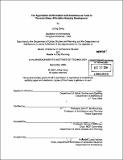The application of information and incentives as tools to promote green affordable housing development
Author(s)
Geng, Lining, 1976-
DownloadFull printable version (27.30Mb)
Other Contributors
Massachusetts Institute of Technology. Dept. of Urban Studies and Planning.
Advisor
John de Monchaux.
Terms of use
Metadata
Show full item recordAbstract
(cont.) developers to produce more green affordable housing. This thesis examines development barriers to green buildings, particularly to green affordable housing. Green buildings offer intangible benefits in the form of improved environment and health through better air quality. Certain green features also offer significant life-cycle operating savings. These advantages are particularly valuable for affordable housing projects, where low operating costs are critical to affordability and higher indoor air quality is beneficial to modest-income residents that can rarely affect the quality of their living environment. Furthermore, there are many monetary, regulatory, and technical regulations and incentives in the U.S. to promote green building development. Notwithstanding the above advantages and supports, green affordable housing is not yet standard practice. Information and incentives are identified as two of the most important and easy-to-implement tools to promote green affordable housing development. Examples of available information and incentive mechanisms in the U.S. are briefly presented for the green affordable housing industry. Meanwhile, gaps and dysfunctions in the application of these tools are identified as development barriers. The Upham's Corner Marketplace Redevelopment in Massachusetts is presented as an example of a green affordable housing project. Finally, recommendations are made to better utilize information and incentives as tools to promote and sustain green affordable housing development. A green guarantee program, with more efficient information collection and incentive application, is proposed as a means to simplify and standardize certain aspects of the development process for green affordable housing to lower project risks, and to encourage investors and
Description
Thesis (M.C.P.)--Massachusetts Institute of Technology, Dept. of Urban Studies and Planning; and, (S.M.)--Massachusetts Institute of Technology, Dept. of Architecture, 2004. Includes bibliographical references (p. 85-89).
Date issued
2004Department
Massachusetts Institute of Technology. Department of Architecture; Massachusetts Institute of Technology. Department of Urban Studies and PlanningPublisher
Massachusetts Institute of Technology
Keywords
Architecture., Urban Studies and Planning.